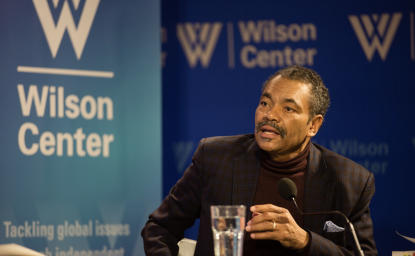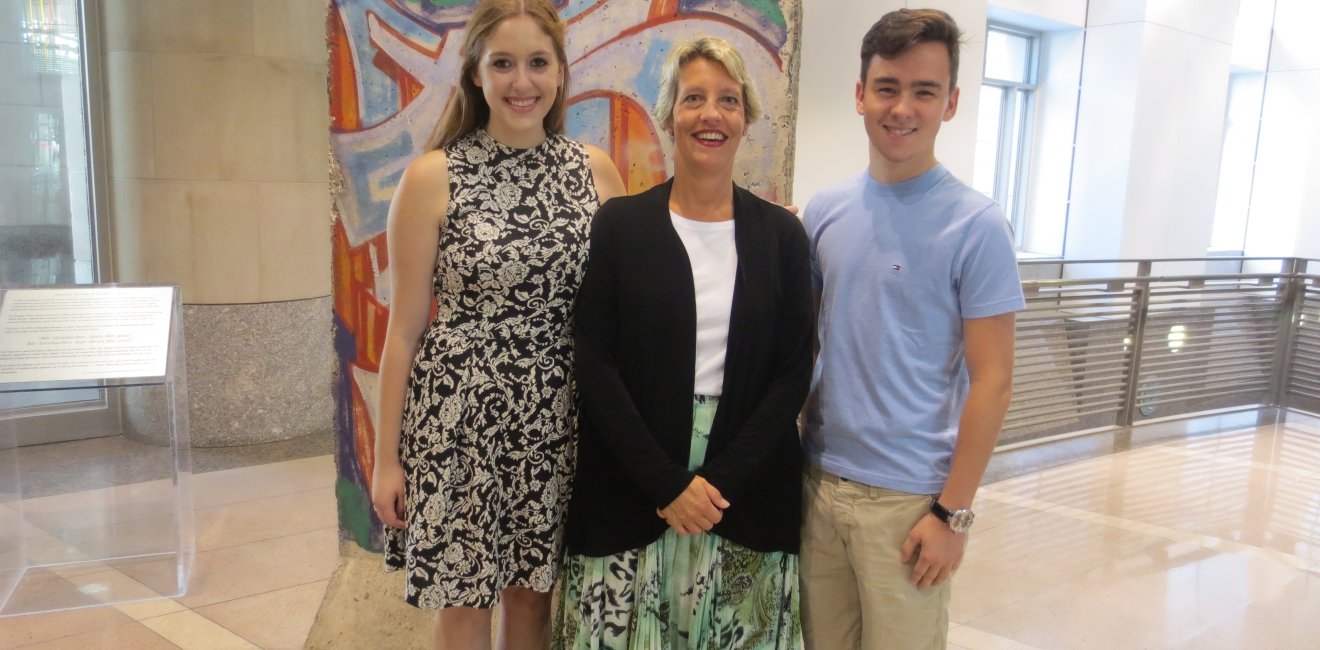
A blog of the Wilson Center
Dr. Hope Harrison was a Public Policy Fellow with the History and Public Policy Program as well as the Cold War International History Project at the Wilson Center in Washington, D.C. from June 2014 to October 2016. She is an Associate Professor of History & International Affairs at George Washington University’s Elliott School of International Affairs. Her focuses are on the Berlin Wall, Germany, international history of the Cold War, and Russian foreign policy. She is also the author of the award-winning book Driving the Soviets up the Wall (Princeton Univ. Press, 2003).
Q&A
Q: Your new book, “After the Berlin Wall: Memory and the Making of the New Germany, 1989 to the Present,” will be published this November by Cambridge University Press for the 30th anniversary of the fall of the Berlin Wall. Can you tell the Wilson Center audience more about it?
My book examines conceptions of national identity in contemporary Germany by studying Germany’s approach to the history and commemoration of the Berlin Wall over thirty years. Since Germany is the most powerful state in Europe, how its leaders and others see the nation and its history matters. More than any other state, Germans have focused their collective memory on a negative part of their history, the Holocaust, in contrast to most nations who look to glorious moments in their past to define their national identity. To a significant degree, Germans have defined themselves for decades as perpetrators of the Holocaust and have carefully constructed domestic and foreign policies to acknowledge this, from civic education programs at home to constrained, multilateralism abroad.
On the 20th anniversary of the fall of the Berlin Wall in 2009, Chancellor Angela Merkel and other German leaders embraced a new national narrative focusing on the East German heroes of the “peaceful revolution” of 1989 which brought down the Berlin Wall and the communist regime behind it and then brought about unification with West Germany. How and why did this change in national narrative occur? My book examines the “memory activists” who contributed to this new narrative and to other narratives since 1989 about the Berlin Wall and its meaning and legacy.
A rarity among German mainstream politicians, the leaders in 2009 spoke of their “pride” in the history of 1989 and the peaceful fall of the Wall, seeming to feel some of the weight of the dark German past being lifted from their shoulders. Yet approaching the 30th anniversary of the fall of the Wall on November 9 and faced with rising right-wing populism in the country, particularly in the former East, German leaders are now more worried than proud. They fear that too many of their fellow citizens support policies of exclusion and hostility toward others instead of the far more open attitudes the centrist leaders associate with the fall of the Wall: the belief that freedom cannot be stopped, borders have no place in contemporary Europe, and walls are antithetical to democracy. German leaders are now much more worried that other parts of German history have stronger ties to the present and have accordingly adopted urgently admonishing tones about the need to defend democracy, freedom and human rights.
Merkel and others fear that the history of the erection and 28-year-long existence of the Berlin Wall, together with the memory of the Holocaust, seem to reflect more of the challenges in contemporary Germany than memory of the fall of the Wall does. Being aware of the former aspects of German history and wanting to highlight the latter, German leaders are practicing a juggling act regarding the commemoration of the 30th anniversary of the fall of the Wall this year. My book puts this in the context of three decades of debates about and memories of the Berlin Wall, ranging from the desire to forget about the Wall, the imperative of commemorating the victims of the Wall, the celebration of the fall of the Wall, to the drawing of lessons from the history of the Wall. I argue that the memory of the Berlin Wall has joined the Holocaust as a key aspect of German collective memory and demonstrate in the book the intersection of these two strands of history in contemporary German commemoration.
Q: How do you relate your teaching of the Cold War, the Berlin Wall, united Germany, etc. to today?
At a time when President Trump continues to demand the extension of a wall on our border with Mexico and when countries such as Hungary, Austria, and Slovenia have constructed many miles of border wall or fence to keep out immigrants, the world has changed dramatically since the fall of the Berlin Wall on November 9, 1989. Although the communist East German regime built the Berlin Wall in 1961 to wall in their own citizens and stop their exodus to the West while the more recent walls have been erected to prevent refugees from entering, they have much in common. They were built by regimes who see those on the other side as enemies. They wrench families apart. And they present profound moral implications for those involved in their development and manning. Even thirty years after the opening of the Berlin Wall, Germans are still grappling with its legacy of violence and division.
Berlin and Germany were at the heart of the Cold War, sometimes serving as the main area of conflict between East and West and sometimes serving as a bridge between the two. With renewed tensions between the US and Russia in recent years, Germany is again stuck in the middle, albeit in rather different ways than before. Germany is a key target of Trump’s ire about trade and about burden sharing in NATO and is also a target of Russian attempts to influence elections. Both the Trump and Putin administrations are backing right-wing groups in Germany. In contrast, transatlanticists in both the US and Germany are doing all they can to continue to foster democracy and tolerance in Germany and close relations between the two countries.
Germany remains the lynchpin of Europe, and German policies are built on memories of the Cold War, the division of Germany, and older parts of German history, most prominently the Holocaust. Understanding German history and the Cold War is essential to comprehending developments in Germany now, such as lingering East-West tensions within Germany and Germany’s relations with both the US and Russia.
Q: Have you found your association with the Wilson Center to be beneficial to your work?
Yes, it has been extraordinarily beneficial to my work. A few of us who were Wilson Fellows together started a writing group to meet each week and spur each other on to the completion of our books. I am still in touch with one of them (Amal Hassan Fadlalla) and we compare notes on our work all the time. She published her book last year, and I will publish mine this fall. Christian Ostermann, Director of the History and Public Policy Program, has also been incredibly helpful with my book, reading and commenting on my manuscript and helping me to think it through. He is a wonderful colleague. I look forward to presenting my book at the Wilson Center!
Q: Do you have any upcoming projects or other future plans you can tell us about?
My future projects will include more work on German collective memory and commemoration and also a study of life along the former East German border at the Baltic Sea, including stories of people who escaped across the Baltic Sea or failed in their attempt.
Author

Professor of History and International Affairs, The George Washington University

History and Public Policy Program
A leader in making key foreign policy records accessible and fostering informed scholarship, analysis, and discussion on international affairs, past and present. Read more

Explore More in Scholar & Alumni Spotlight
Browse Scholar & Alumni Spotlight
Olufemi Vaughan: Shaping Governance Through Scholarship and Dialogue

Dr. Maurice Jackson: The Sounds of Resistance Throughout History


